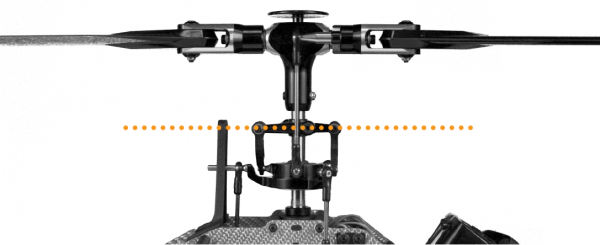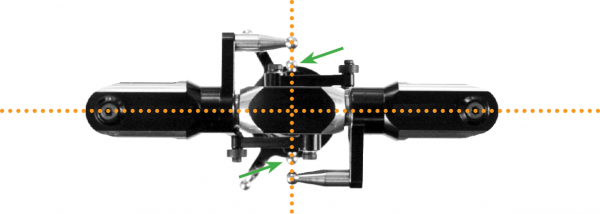Manuals:MB Plus:Setupmenu G: Difference between revisions
Shornstein (talk | contribs) No edit summary |
Shornstein (talk | contribs) No edit summary |
||
| (4 intermediate revisions by the same user not shown) | |||
| Line 1: | Line 1: | ||
<translate> | |||
<!--T:1--> | |||
{{TOC_MBPlus}} | {{TOC_MBPlus}} | ||
{{DISPLAYTITLE:Setup menu point G|noerror}} | {{DISPLAYTITLE:Setup menu point G|noerror}} | ||
When entering Setup menu point G connect all swashplate servos as described in chapter 3.3. They now will be running to their origin zero position (1520 µs) what we call reference position here when the Status-LED is off. This reference position is used to mount the servo horns on the servos at their true center position, so that you get roughly equal throws to both direction. Mount the servo horns so that they form as much as possible a 90 degrees angle to the linkage rod. Then in the next step you electronically fine trim every single servo‘s center position, as usually mounting the servo horn at exact 90 degrees will not work out perfectly depending on the servo‘s gear train and the servo horn.<br /> | When entering Setup menu point G connect all swashplate servos as described in chapter 3.3. They now will be running to their origin zero position (1520 µs) what we call reference position here when the Status-LED is off. This reference position is used to mount the servo horns on the servos at their true center position, so that you get roughly equal throws to both direction. Mount the servo horns so that they form as much as possible a 90 degrees angle to the linkage rod. Then in the next step you electronically fine trim every single servo‘s center position, as usually mounting the servo horn at exact 90 degrees will not work out perfectly depending on the servo‘s gear train and the servo horn.<br /> | ||
<br /> | <br /> | ||
| Line 13: | Line 14: | ||
|CH 2 – aileron(1) servo center trim adjust | |CH 2 – aileron(1) servo center trim adjust | ||
|CH 3 – aileron(2)/pitch servo center trim adjus | |CH 3 – aileron(2)/pitch servo center trim adjus | ||
}}<br /> | }} | ||
<br /> | |||
{{QUOTE|Only the trimmed servo positions are important and get stored (those which have been set with the corresponding Status-LED colors). The servo positions at '''Status-LED off''' only serve for reference and to get the servo horns best plugged into position, for instance if you install new servos or replace the servo gears after a crash. This reference position will not be used later onwards. '''Only the servo positions with active trimming are important.'''}}<br /> | {{QUOTE|Only the trimmed servo positions are important and get stored (those which have been set with the corresponding Status-LED colors). The servo positions at '''Status-LED off''' only serve for reference and to get the servo horns best plugged into position, for instance if you install new servos or replace the servo gears after a crash. This reference position will not be used later onwards. '''Only the servo positions with active trimming are important.'''}}<br /> | ||
<br /> | <br /> | ||
| Line 22: | Line 24: | ||
[[Image:Swashdriver_2.png|600px|none|border]]<br /> | [[Image:Swashdriver_2.png|600px|none|border]]<br /> | ||
<br /> | <br /> | ||
<br /> | |||
---- | |||
Push the button to save the configuration and to proceed to [[Manuals:MB_Plus:Setupmenu_H|Setup menu point '''H''']]. | Push the button to save the configuration and to proceed to [[Manuals:MB_Plus:Setupmenu_H|Setup menu point '''H''']]. | ||
---- | |||
</translate> | </translate> | ||
Latest revision as of 09:59, 29 May 2015
When entering Setup menu point G connect all swashplate servos as described in chapter 3.3. They now will be running to their origin zero position (1520 µs) what we call reference position here when the Status-LED is off. This reference position is used to mount the servo horns on the servos at their true center position, so that you get roughly equal throws to both direction. Mount the servo horns so that they form as much as possible a 90 degrees angle to the linkage rod. Then in the next step you electronically fine trim every single servo‘s center position, as usually mounting the servo horn at exact 90 degrees will not work out perfectly depending on the servo‘s gear train and the servo horn.
Note: Although if you were able to mount the servo horn perfectly at 90 degrees, check the electronical trimming as described below as the reference possition is not used later onwards and in operation but the trimmed position is!
If you move the rudder stick to a single direction once, you can select one servo and change its center position by moving the elevator stick back and forth. Every color of the Status-LED is corresponding to a specific servo channel that is indicating its selection by a short up and down move. If you move the rudder stick once again in the same direction as before, you can select the next swash servo and adjust its center position by using the elevator stick. You can switch back and forth between the servos as often as you need and also switch back to the reference position anytime. The already adjusted servo centers will not be lost by doing this.
| Status-LED | Swashplate servo center trim |
|---|---|
| off | Swashplate servos at reference position |
| purple | CH 1 – elevator servo center trim adjust |
| red | CH 2 – aileron(1) servo center trim adjust |
| blue | CH 3 – aileron(2)/pitch servo center trim adjus |
Only the trimmed servo positions are important and get stored (those which have been set with the corresponding Status-LED colors). The servo positions at Status-LED off only serve for reference and to get the servo horns best plugged into position, for instance if you install new servos or replace the servo gears after a crash. This reference position will not be used later onwards. Only the servo positions with active trimming are important.
Now if servos are trimmed do not yet proceed to the next menu point. With active trimming (Status-LED still lights up in one color!) adjust the linkage rods according to your helicopter manual. The swashplate should now be at the midpoint and perpendicular to the main shaft and the rotor blades should have 0 degrees of pitch. Always work this out from bottom (servos) to top (blade grips). Also don‘t forget to level and phase the swashplate driver in the correct way (if it‘s adjustable)! At 0 degrees of pitch the swash driver arms must be horizontal and the linkage balls of the blade grips have to be perpendicular to the spindle shaft.


Push the button to save the configuration and to proceed to Setup menu point H.